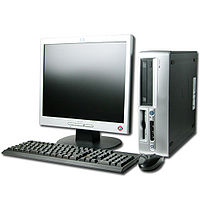Computer
From booktorrent

Contents |
Computer
"Also called processor. an electronic device designed to accept data, perform prescribed mathematical and logical operations at high speed, and display the results of these operations[2]."
Computers are often used to run applications and programs that are designed to allow users to digitally create and edit (and delete) things. These programs and applications render coding into text, pictures, video, and other things that the user interacts with on the computer monitor by means of controlling and providing media input with a keyboard, mouse, and/or other peripherals such as microphones, video cameras, digital tablets, and other specialized input devices.
Commonly used programs include word processors such as Microsoft Word and Openoffice.org, image processors such as Microsoft Paint and Adobe Photoshop, audio and visual media processors such as Window's Movie Maker and Apple's Final Cut Pro, games like Solitaire and Minesweeper, and Internet Browsers such as Firefox, Google Chrome, and Internet Explorer to name a few major competitors.
Uses In Education
All universities and colleges in the United States are furnished with computer labs. Because many professors require their students to turn in typed documents, it is more convenient to have computer labs on campus for student use. Teachers use computers to administer assignments, keep track of grades or offer online instruction. Many teachers use online resources in their daily lessons[3].
Online Education
"There is an entire 'sub-industry' of education called 'online education.' Online education is done primarily through the usage of computers and the Internet where the student does the classwork from home[4]."
Self-Learning
"In addition to books, video and other materials, self-directed learners often use computers to continue their education outside of, or in addition to, traditional facilities[5]."
